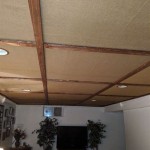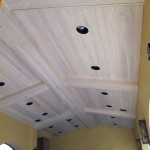Why Are Ceilings Low in England and Wales?
Have you ever visited an old building in England or Wales and been surprised by the low ceilings? You're not alone. This architectural quirk is a common feature in historic properties, and there are several reasons why.
Building Techniques: One factor contributing to low ceilings is the traditional building techniques used in England and Wales. Many older buildings were constructed using thick stone walls and heavy wooden beams. These materials provided structural stability but also took up a significant amount of space, leaving less room for headroom.
Fire Safety: Low ceilings can also be attributed to fire safety concerns. In the past, buildings were often heated by open fires. These fires could spread quickly, so keeping ceilings low helped to contain the flames and prevent them from reaching the thatched or wooden roofs, which were vulnerable to catching fire.
Heat Conservation: Another reason for low ceilings is heat conservation. In the cold, damp climate of England and Wales, it was essential to keep buildings warm. Low ceilings allowed for more efficient use of heat, as the smaller volume of air required less energy to warm. This was particularly important in the absence of modern heating systems.
Window Placement: The placement of windows also played a role in determining ceiling heights. In older buildings, windows were typically positioned high up on the walls to prevent draughts and improve security. This meant that there was less natural light available, so keeping ceilings low helped to maximize the amount of light that could enter the room.
Architectural Style: In some cases, low ceilings were simply a matter of architectural style. During the Tudor period (1485-1603), it was fashionable to have low, vaulted ceilings. This style continued to be popular in subsequent centuries, although the height of ceilings gradually increased over time.
Modernization: In recent years, many old buildings have been modernized, which has often involved raising ceiling heights. This has been done to meet modern building regulations, improve ventilation, and create a more spacious and comfortable living environment. However, many historic buildings have retained their low ceilings, preserving their architectural heritage and character.

Case Studies Lohas

Audix Introduces M45 Shortgun Aimable Ceiling Microphone Prosoundweb

Narrow Width Short 2 Post Lift Car Vehicle Ramp 4000kg 4ton Tonne Two 1 550 00 Pic

Inequalities Between Linguistic Groups Costs And Educational Services For Minority Age
Spatial Wage Inequality In North America And Western Europe Changes Between Within Local Labour Markets 1975 2024
Promoted Room Treatment This Year S Snake Oil Avforums

Flood Resilient Construction And Adaptation Of Buildings Oxford Research Encyclopedia Natural Hazard Science

Is A Drop Ceiling The Acoustical Prosoundweb

Summary Table Of Major Conclusions

A John Van Der Merchant Of Cologne 306 Aachen 130 Ashgate
Related Posts








